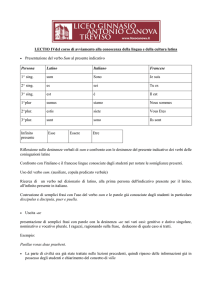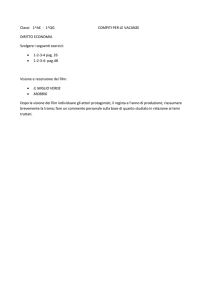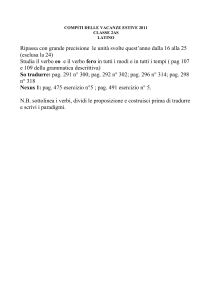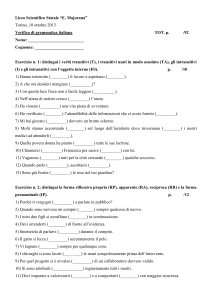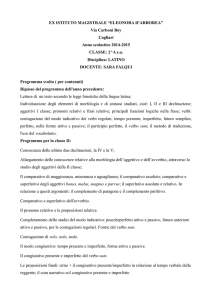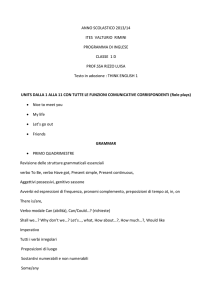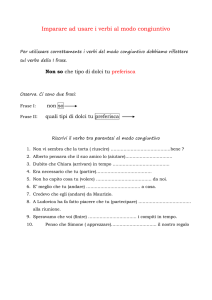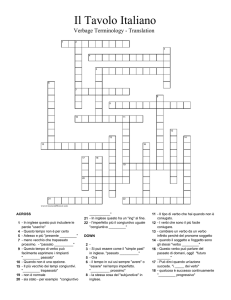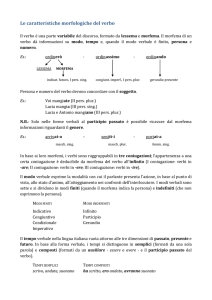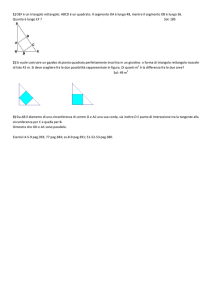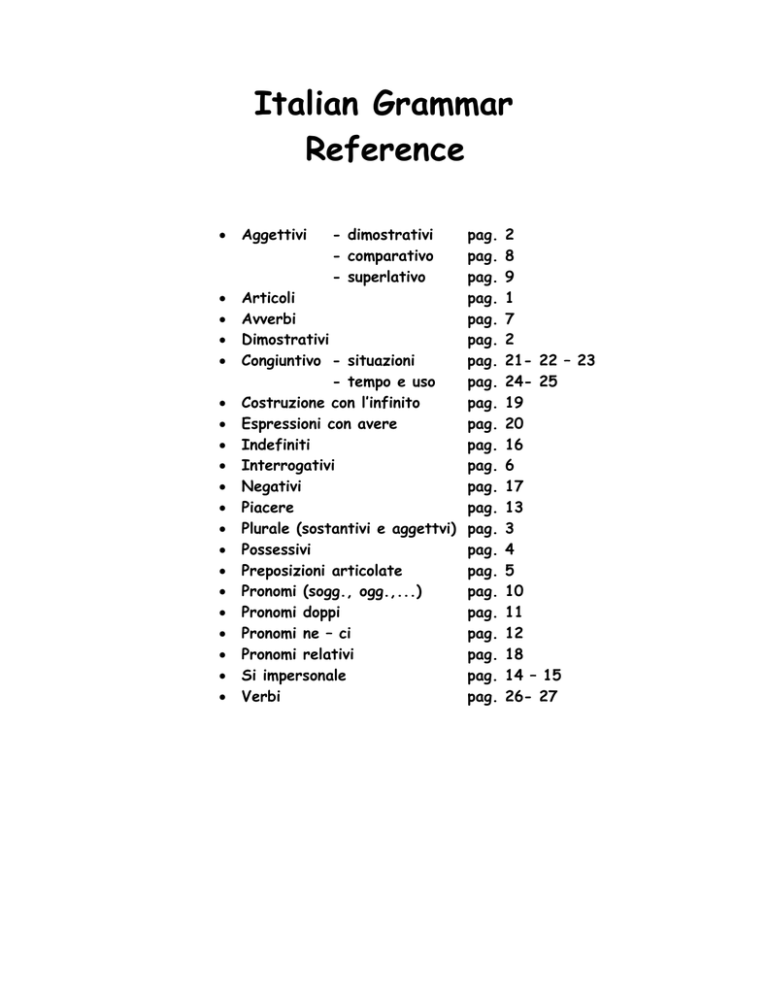
Italian Grammar
Reference
•
•
•
•
•
•
•
•
•
•
•
•
•
•
•
•
•
•
•
•
Aggettivi
- dimostrativi
- comparativo
- superlativo
pag.
pag.
pag.
Articoli
pag.
Avverbi
pag.
Dimostrativi
pag.
Congiuntivo - situazioni
pag.
- tempo e uso
pag.
Costruzione con l’infinito
pag.
Espressioni con avere
pag.
Indefiniti
pag.
Interrogativi
pag.
Negativi
pag.
Piacere
pag.
Plurale (sostantivi e aggettvi) pag.
Possessivi
pag.
Preposizioni articolate
pag.
Pronomi (sogg., ogg.,...)
pag.
Pronomi doppi
pag.
Pronomi ne – ci
pag.
Pronomi relativi
pag.
Si impersonale
pag.
Verbi
pag.
2
8
9
1
7
2
21- 22 – 23
24- 25
19
20
16
6
17
13
3
4
5
10
11
12
18
14 – 15
26- 27
•
ARTICOLI
• Articolo determinativo (the)
maschile
femminile
singolare
plurale
lo Æ z, s + consonant,
gli Æ z, s + consonant,
il Æ all other consonants
l’ Æ vowels
i Æ all other consonants
gli Æ vowels
la Æ all consonants (i + vowel)
l’ Æ vowels
le Æ everything
(gn, ps, pn, x, i + vowel)
(gn, ps, pn, x, i + vowel)
• Articolo indeterminativo (a, an)
singolare
maschile
uno Æ z, s + consonant,
(gn, ps, pn, x, i + vowel)
un Æ all other consonants and vowels
femminile
una Æ all consonants (i + vowel)
un’ Æ vowels
1
•
AGGETTIVI DIMOSTRATIVI
questo (this)
singolare
plurale
maschile
questo
(quest’ Æ vowels)
questi
femminile
questa
(quest’Æ vowels)
queste
*quello (that) follows the pattern of the articolo determinativo:
singolare
maschile
femminile
plurale
quello Æ z, s + consonont,
quegli Æ z, s + consonant,
quel Æ all other consonants
quell’ Æ vowels
quei Æ all other consonants
quegli Æ vowels
quella Æ all consonants
quell’ Æ vowels
quelle Æ everything
(gn, ps, pn, x, i + vowel)
(gn, ps, pn, x, i + vowel)
*the adjective bello follows the same pattern as the articolo determinativo:
singolare
plurale
maschile
bello Æ z, s + consonant, or gn
bel Æ all other consonants
bell’ Æ vowels
begli Æ z, s + consonant, or gn
bei Æ all other consonants
begli Æ vowels
femminile
bella Æ all consonants
bell’ Æ vowels
belle Æ everything
**the adjective buono follows the same pattern as the articolo indeterminativo:
singolare
plurale
maschile
buono Æ z, s + consonant, or gn
buon Æ all other consonants & vowels
buoni Æ all
femminile
buona Æ consonants
buon’ Æ vowels
buone Æ all
2
• SOSTANTIVI (nouns)
In general:
-o
-e
consonant
-a
-e
- zione
maschile (m.)
femminile (f.)
Plural of nouns (and adjectives)
Singolare
Plurale
- o (m.)
- e (m. o f.)
- a (f.)
-i
-i
-e
Il treno Æ i treni
- a (m.)
- ga (m.)
- ga (f.)
- go
- ca
- co
-i
- ghi
- ghe
- ghi
- che
- chi
Il poeta Æ i poeti
Il collega Æ i colleghi
La collega Æ le colleghe
L’albergo Æ gli alberghi
L’amica Æ Le amiche
Il disco Æ i dischi
- co
(stress two
syllables before –co)
- ci
Il medico Æ i medici
Accented vowel
(è, ò,...)
Consonant
Abbreviated
words
- ìo (stressed)
- ìa (stressed)
- io (unstressed)
- ia (unstressed)
(- i)
(- ie)
no change
Il caffè Æ i caffè / la città Æ le città
no change
no change
Il film Æ i film
La foto Æ le foto
- ìi
- ìe
-i
-e
(- i)
(- ie)
Lo zio Æ gli zii
La farmacia Æ le farmacie
Il negozio Æ i negozi
La valigia Æ le valige
La ipotesi Æ le ipotesi
La serie Æ le serie
L’ospedale Æ gli ospedali / La stazioneÆ le stazioni
La piazza Æ le piazze
(stress preceding – co)
3
POSSESSIVI
Aggettivi (my, your…) and pronomi (mine, yours…) agree with the possession and not with
the possessor.
Es. È il cane (m.) di Maria (f.). Æ È il suo (m.) cane (m.).
maschile
femminile
(il) mio
(il) tuo
(il) suo
(la) mia
(la) tua
(la) sua
singolare
(il) nostro
(il) vostro
(il) loro
(la) nostra
(la) vostra
(la) loro
(i) miei
(i) tuoi
(i) suoi
(le) mie
(le) tue
(le) sue
plurale
(i) nostri
(i) vostri
(i) loro
(le) nostre
(le) vostre
(le) loro
Do not use the article when referring to family member in the singular (except “loro”)
Es. Mia madre si chiama Giovanna.
Le mie sorelle sono simpatiche.
La loro madre si chiama Giovanna.
4
PREPOSIZIONI
a
da
di
in
tra /
at, to, in…
Æ
Æ
from, by, to, for..
Æ
of, about, by…
in, to, into…
Æ
fra Æ between, among
su
Æ
con Æ
per Æ
senza Æ
on, over…
with…
for…
without
Preposizioni articolate:
maschile singolare
a
diÆde
da
inÆne
su
con
maschile plurale
femminile
singolare
femminile
plurale
il
lo
l’
i
gli
la
l’
le
al
del
dal
nel
sul
(col)
allo
dello
dallo
nello
sullo
all’
dell’
dall’
nell’
sull’
ai
dei
dai
nei
sui
(coi)
agli
degli
dagli
negli
sugli
alla
della
dalla
nella
sulla
all’
dell’
dall’
nell’
sull’
alle
delle
dalle
nelle
sulle
5
• INTERROGATIVI
Invariable interrogatives
Chi?
Che cosa? * (Che? Cosa?)
Che?
Quanto?
Come?
Dove?
Perché?
Quando?
who? whom?
what?
what kind of?
how much?
how?
where?
why?
when?
Variable interrogatives
Quale/ Quali
Quanto/i/a/e?
which?
how much/ how many?
*(che) cos’è Æ what is…? : request for a definition or an explanation
Es. (Che) cos’è la filosofia?
Qual è Æ what is…? : request for an information; the answer calls for a choice.
Es. Qual è la tua pizza preferita?
- Prepositions always precede the interrogatives:
Es. A chi scrivi? Per quale ragazza fai il regalo? Di che cosa è fatto? Con quante persone sei uscito?
- The subject is usually placed at the end. After “perché” the subject may appear either at the
end of the question or before the verb.
Es. Dove va Maria? Con chi ha lavorato Maria?
Perché è andata a casa Maria? or Perché Maria è andata a casa?
6
• AVVERBI
Modify
a verb Æ (verb + adverb)
an adjective Æ (adverb + adjective)
another adverb
- adjective Æ feminine singular + mente
Es. Rapido (adj. m.s.) Æ rapida (adj. f. s.) Æ rapidamente
- adjective ending in –le or -re Æ -le, -re + mente
Es. Regolare Æ regolar Æ regolarmente
Common adverbs that do not end in –mente:
bene
well
male
badly
troppo
too much
molto
very
assai
very much
tanto
so much,very much
presto
quickly, soon, early
subito
immediately
spesso
often
sempre
always
già
already
these are placed between the auxiliary verb and the past participle
mai
ever / never
Es. Sono già stato in Italia.
ancora
still
7
•
• Comparativi
Comparativo di uguaglianza (=):
AGGETTIVI
Aggettivi:
as. . .as
as. . .as
(così) + aggettivo o avverbio + come
(tanto) + aggettivo o avverbio + quanto
*When a personal pronoun follows come or quanto, it is a stressed pronoun (me, te, lui…).
Es. Maria è (tanto) alta quanto me. Maria è (così) alta come me.
Sostantivi (nouns):
as much as; as many. . .as
tanto + sostantivo + quanto
*tanto + sostantivo + quanto usually agrees in gender and number with the
noun it modifies.
Es. Mario ha tanti libri quanti dischi.
Verbi:
as much as
Verbo + tanto quanto
Es. Mangio tanto quanto lui.
Comparativo di maggioranza (+) e minoranza (-):
più/meno. . .di:
più. . .di
meno. . .di
more. . .than/-er. . .than
less. . .than/-er. . .than
Es. Giovanna è più bella della sua amica. L’amica è meno bella di Giovanna.
più/meno. . .che:
(comparing two of the same construction: two adjectives, two nouns, two infinitives, two etc.)
più. . .che
meno. . .che
more. . .than/-er. . .than
less. . .than/-er. . .than
Es. Lui ha più libri che cd. Or Lui ha più cd che libri. (two nouns)
8
• Superlativi
Superlativo relativo (the fastest, the most elegant)
Aggettivo
Articolo + più / meno + aggettivo (+ di)
Es. Marco è il più intelligente (della classe). Marco is the most intelligent (in the class).
Sostantivo + aggettivo
Articolo + sostantivo + più / meno + aggettivo (+ di/fra)
Es. Questo è il libro più interessante. This is the most interesting book.
Superlativo assoluto
Aggettivo + issimo/a/i/e
famos- o/a/i/e Æ famos-issimo/a/i/e Æ very famous
veloc- e/i Æ veloc- issimo/a/i/e
Æ very fast
or
molto (invariabile) + aggettivo
molto veloce Æ very fast
9
PRONOMI
Soggetto 1
Tonici 2
(I, you,…)
(stressed pronouns):
normally preceded by
preposizione (es. a,
Oggetto diretto Oggetto indiretto
3
(me, you,…)
4
(to/for me, to/for you,…)
Riflessivi 5
(myself, yourself..)
per, da, con…).
Sing.
io
I
tu
you
Plur.
noi
we
voi
you
Sing.
me
te
me
you
Lei,
(Loro),
Lei,
you
form.
you form.
you from.
loro
lui/lei,
lui/lei
he/she
they
him/her
sé
himself/
herself/
oneself
Plur.
noi
us
voi
you
(Loro),
you form.
loro,
them
sé
themselves
Sing.
mi
ti
me
you
La,
you form.
lo/la
him/her
Plur.
ci
us
vi
you
Sing.
mi
ci
ti
(to/for) you
Le,
(to/for) me
(Li/Le)
you form.m./
you form.f.
li/le
them m./
them f
Plur.
(to/for) you form.
gli/le
(to/for) him/her
Sing.
Plur.
mi
ci
vi
ti
vi
(to/for) you
yourself
yourselves
(Gli),
si
si
themselves
gli,(loro)
himself/
herself/
oneself
(to/for) us
(to/for) you
form.
myself
ourselves
(to/for)
them
Es.
1. Io mangio la pasta. (soggetto)
2. Ti parlo. Æ Parlo a te. (tonico)
3. Vedo il cane. Æ Lo vedo. (diretto). Ho visto Maria. La ho vista.
4. Parlo a Maria. Æ Le parlo.(indiretto)
5. a) Io mi lavo. I wash myself. (riflessivo)
b) Noi ci amiamo. We love each other (reciproco) ÆThe plural reflexive pronouns (ci, vi, si) can
be used with the first- (noi), second- (voi), and third-person (loro) plural verbs to express reciprocal
actions.
10
• PRONOMI DOPPI (indiretti + diretti)
Ind.↓
Dir.→
miÆ me
tiÆ te
gli, le, Le
ciÆ ce
viÆ ve
gli, Gli
lo
la
li
le
ne
me lo
te lo
glielo
ce lo
ve lo
glielo
me la
te la
gliela
ce la
ve la
gliela
me li
te li
glieli
ce li
ve li
glieli
me le
te le
gliele
ce le
ve le
gliele
me ne
te ne
gliene
ce ne
ve ne
gliene
Ho scritto a Maria. Æ Le ho scritto. (indiretto)
Ho scritto la lettera. Æ La ho scritta. (diretto)
Ho scritto la lettera a Maria. Æ Gliela ho scritta.
(dir.)
(ind.)
11
• PRONOMI “ne” - “ci”
-di (of, about)/ parlare di/ discutere di/ avere bisogno di
Hai paura dei topi? Sì, ne ho paura.
avere paura di
avere voglia di
ne:
-espressioni di quantità
quanto, molto, troppo, un chilo di, un litro di…
Guardo molta T.V. = Ne guardo molta.
(These tend to be direct objects and change the ending of participles.
Es. Ho mangiato molti dolci. Ne ho mangiati molti.)
-a, in, su, da + places
Quando andate a fare la spesa? Ci andiamo il sabato pomeriggio.
ci:
-pensare a, credere a
Lei crede agli UFO? Sì, ci credo.
12
Parte indiretta
(pronome indiretto)
Mi
A me
Ti
A te
Gli
A lui
A Marco
A mio zio (fam.sing.-> no art.)
Al mio amico
Allo studente
All’attore
Le
A lei
A Maria
A mia zia (fam. sing.->no art.)
Alla mia amica
All’attrice
Ci
A noi
Vi
A voi
Gli
A loro
A Maria e Marco
Ai miei zii
Agli amici
Alle amiche
Verbo piacere
Soggetto
piacciono (plur.)
la pizza (sing.)
mangiare le pizze
le pizze (plur.)
è piaciuta (f.s.)
la pizza
è piaciuto (m.s.)
il panino
piace (sing.)
Tempo
verbale
Presente
(f.s.)
(m.s.)
Passato
prossimo
mangiare le pizze
sono piaciute (f.p.)
le pizze (plur.)
sono piaciuti (m.p.)
i panini (plur.)
piaceva (sing.)
piacevano (plur.)
la pizza (sing.)
mangiare le pizze
le pizze (plur.)
piacerà (sing.)
la pizza (sing.)
piaceranno (plur.)
mangiare le pizze
le pizze (plur.)
Futuro
la pizza (sing.)
mangiare le pizze
le pizze (plur.)
Condizionale
presente
piacerebbe (sing.)
piacerebbero (plur.)
13
Imperfetto
SI “IMPERSONALE”
Tutti mangiano.
Noi mangiamo.
Loro mangiano.
Le persone mangiano.
Tu mangi.
La gente mangia.
Si mangia.
(impersonal and generic subject)
Si + verb third person singular (+ infinitive verb/s)
Si mangia. Si può mangiare. Si vuole mangiare, bere e dormire.
Si + verb third person plural + plural object
Si mangiano i biscotti.
Also used to express common knowledge
For example:
Si sa che… = It’s common knowledge that…
Si capisce che… = It’s obvious that…
Si vede che… = It’s clear that…
14
•
When followed by adjectives Æ they are plural masculine:
Tutti sono stanchi.
Noi siamo stanchi.
Loro sono stanchi.
Le persone sono stanche.
Tu sei stanco.
La gente è stanca.
•
Si è stanchi.
When used with a reflexive verb Æ CI SI :
Tutti si lavano.
Noi ci laviamo.
Loro si lavano.
Le persone si lavano.
Tu ti lavi.
La gente si lava.
•
Ci si lava.
In compound tenses Æ always use auxiliary “essere”:
1-
Tutti hanno mangiato.
Noi abbiamo mangiato.
Loro hanno mangiato.
Le persone hanno mangiato.
Tu hai mangiato.
La gente ha mangiato.
Si è mangiato.
2- with verbs normally conjugated with “essere”, the past participle is plural.
Tutti sono andati.
Noi siamo andati/e.
Loro sono andati/e.
Si è andati.
Le persone sono andate.
Tu sei andato/a.
La gente è andata.
15
Pronomi indefiniti
ognuno/a (each, everyone)
qualcuno/a (someone)
qualcosa (m.) (something)
tutto (all, everything)
tutti/e (all, everybody)
alcuni/e (some)
• INDEFINITI
use with singular verb (3rd person)
use with plural verb (3rd person)
Aggettivi indefiniti
always precede the noun:
ogni (every, each)
qualunque (any, any sort of)
qualche (some, a few)*
use only with a singular noun
alcuni/e (some, a few) *
use only with plural nouns
tutto/i/a/e (all, every) + articolo
altro/i/a/e (other)
molto/i/a/e (many, a lot of)
poco/hi/a/he (little, few)
troppo/i/a/e (too much, too many)
agrees with the noun being
modified
* You can also express “some” or “any” by using di + article or un po’ di
Es. Ho comprato delle mele. Ho comprato un po’ di mele. Ho comprato alcune mele.
Ho comprato qualche mela (s.).
With uncountable nouns you can only use di + article or un po’ di.
Es. Bevo dell’acqua. Bevo un po’ d’ acqua.
16
• NEGATIVI
Affermativo
Negativo
qualcosa (something)
tutto (everything)
non + verbo + niente/nulla (nothing)
qualcuno (somebody)
tutti (everyone)
non + verbo + nessuno (nobody)
sempre (always)
non + verbo + mai (+ participle) (never)
qualche volta (sometimes)
mai (ever)
già (already)
non + verbo + ancora (+ participle) (not yet)
ancora (still)
non + verbo + più (no longer)
non + verbo +
neanche
nemmeno
neppure
(not even)
non + verbo + affatto (non at all)
o (or)
non + verbo + né … né (neither… nor)
17
• PRONOMI RELATIVI
- che who, whom, that, and which.
*refers to both persons and things.
Es. La pizza, che ho mangiato, era molto buona.
- cui used instead of che when there is a preposition (a, con, su, per, di, da,…)
*refers to both persons and things.
Es. Il ragazzo, con cui sono uscita, è simpatico. Lo zio, a cui ho scritto la lettera, si chiama Marco.
- quello che, tutto quello che, ciò che (all) that which or what
*does not refer to a preceding noun (
)
*refers to things.
Es. Ho capito quello che hai detto.
- chi
Ciò che dici mi interessa molto.
the one(s) who, he/she who, or those who.
*does not refer to a preceding noun (
*it is often found in proverbs
*refers to persons.
La persona che
La gente che
)
+ verbo singolare
CHI
+ verbo singolare
Le persone che
+ verbo plurale
Es. La persona che studia passa l’esame. Æ Chi studia passa l’esame.
Es. Le persone che studiano passano l’esame. Æ Chi studia passa l’esame.
Es. Dedico questa canzone alle persone che sono innamorate. Æ Dedico questa canzone a chi è
innamorato.
18
• COSTRUZIONE CON L’INFINITO
VERBO + A + INFINITO (conjugated verb is preparatory to the infinitive)
abituarsi (to get used to)
aiutare (to help)
andare (to go)
cominciare (to begin)
continuare (to continue)
convincere (to convince)
mandare (to send)
passare (to pass)
preparare (to prepare)
spingere (to push)
fermarsi (to stop oneself)
forzare (to force)
imparare (to learn)
incoraggiare (to encourage)
insegnare (to teach)
invitare (to invite)
obbligare (to oblige)
persuadere (to persuade)
riuscire (to succeed)
venire (to come)
Es. Vado a giocare.
VERBO + DI + INFINITO
accettare (to accept)
avere bisogno (to need)
avere paura (to be afraid)
avere voglia (to feel like)
cercare (to try)
finire (to finish)
permettere (to allow)
ricordare (to remember)
sperare (to hope)
chiedere (to ask)
credere (to believe)
decidere (to decide)
dimenticare (to forget)
dire (to say)
pensare (to plan)
promettere (to promise)
smettere (to stop, cease)
Es. Lui ha paura di nuotare.
*Use per before an infinitive to express purpose (in order to)
Es. Ho telefonato per salutarti.
I called (in order) to say hello to you.
Verbi più usati seguiti direttamente dal verbo all’infinito:
dovere
potere
volere
preferire
piacere
desiderare
Es. Lui vuole andare. Lei preferisce giocare.
19
• Espressioni idiomatiche con “avere”
avere fame- to be hungry
avere sete- to be thirsty
avere ragione- to be right
avere sonno- to be sleepy
avere bisogno di- to need
avere caldo- to feel warm/hot
avere fretta- to be in a hurry
avere paura di- to be afraid of
avere freddo- to feel cold
avere voglia di- to feel like
20
• CONGIUNTIVO
Situations which require the congiuntivo:
1. Opinion, possibility, hope, desire, expectation, doubt, emotion:
Common Expressions that Precede the Congiuntivo
EXPRESSIONS INDICATING EMOTION/ FEAR/HOPE:
Sono contento/felice che
Mi (dis)piace che
Ho piacere che
Ho paura che
Temo che
Preferisco che
Spero che
I am happy that
I am sorry that
I am pleased that
I fear that
I fear that
I prefer that
I hope that
EXPRESSIONS INDICATING OPINION, DOUBT, UNCERTAINTY:
Penso che
Credo che
Dubito che
Ho l’impressione che
Immagino che
Ignoro se
Suggerisco che
Suppongo che
I think that
I believe that
I doubt that
I have the impression that
I immagine that
I ignore if
I suggest that
I suppose that
EXPRESSIONS INDICATING A COMMAND OR WISH:
Chiedo che
Desidero che
Esigo che
Insisto che
Voglio che
(Mi) aspetto che
Richiedo che
I ask that
I desire that
I demand that
I insist that
I want that
I expect that
I request that
IMPERSONAL VERBS AND EXPRESSIONS:
(Non) bisogna che
(Mi) pare che
Peccato che
Può darsi che
(Mi) sembra che
Può essere che
(Mi) occorre che
It is necessary
It seems (to me)
It’s a shame/ It is too bad
It’s possible
It seems (to me)
It could be
(I need) / it is necessary
21
2. “Essere” followed by certain adjectives and adverbs – Espressioni impersonali:
(Non) è…
facile/difficile
possibile/impossibile
probabile/improbabile
(un) peccato
necessario
importante
bello/brutto
bene/male
meglio/peggio
(una) vergogna
preferibile
giusto/ingiusto
ora/tempo
opportuna/inopportuno
incredibile
strano
3. Certain conjunctions:
affinché
di modo che
perché*
so that, in order that
benché
quantunque
sebbene
nonostante
malgrado
although, even though
a patto che
purché
a condizione che
provided that, on condition that
a meno che...non
unless
qualora
nel (in) caso che
if, in case, in the event that
prima che*
before
senza che*
without
* Note:
“Prima che,” “senza che,” and “perché” (so that) are used when the subjects of the two
clauses are different. When the subjects are the same, “prima di + infinitive,” “senza + infinitive,”
“per + infinitive”
22
4. Superlatives:
il più...che
il migliore...che
l’ unico...che
il primo...che
l’ ultimo...che
il solo...che
5. Negatives:
nulla...che
niente...che
nessuno...che
6. The “-unque” words (in dependent clauses):
whoever, whomever
chiunque
comunque
however, no matter how
wherever
dovunque
qualunque
whatever,whichever (adjective)
qualunque cosa
whatever, no matter what (pronoun)
7. After an indefinite noun followed by “che” with a certain meaning:
un/ uno/ una/ un’… + che
Es. Dobbiamo trovare una macchina che non costi troppo.
(What kind of car? One that doesn’t cost too much.)
8. Indirect speech preceded by an interrogative pronoun
chiedere
non sapere
non capire
domandare
chi, che cosa, dove, come,
quando, perché
Es. Mi domandano dove Lisa abbia studiato.
Non capisco perche' non gli sia piaciuta la festa.
Non so quante birre abbiano bevuto.
23
• TIME AND USE OF THE CONGIUNTIVO
Indipendente al presente (futuro, imperativo)
(lui pensa)
-Use the presente if the events
happen at the same time:
A
B
Io penso che lui vada.
I think that he is going.
Indipendente al passato o condizionale
(lui pensava)
-Use the imperfetto if the events
happen at the same time:
A
B
Io pensavo che lui andasse.
I thought that he was going.
A
B
|
-Use the passato if the event in the
dependent clause happened before
the event in the independent clause:
A
B
Io penso che lui sia andato.
I think that he went.
B
|
A
B
|
-Use the trapassato if the event in the
dependent clause happened before the
event in the independent clause:
A
B
Io pensavo che lui fosse andato.
I thought that he had gone.
A
|
B
|
24
A
|
Which tense of the congiuntivo to use?
1. Does the independent clause require congiuntivo or indicativo?
Congiuntivo
2. What is the verb tense of the independent clause?
(Lui pensa)
(Lui pensava)
Presente, Futuro,
Imperativo
Passato, Condizionale
3. What is the time of the depend clause
in relation to the independent?
At the same time:
A,B
|
Congiuntivo
Presente
Es. che io mangi
At different times:
B
A
|
|
3. What is the time of the depend clause
in relation to the independent?
At the same time:
A,B
|
Congiuntivo
Passato
Congiuntivo
Imperfetto
Es. che io abbia
mangiato
Es. che io mangiassi
25
At different times:
B A
|
|
Congiuntivo
Trapassato
Es.che io avessi
mangiato
Present - Presente
–ARE
lavor–o
io
–i
tu
lui/lei/Lei –a
–iamo
noi
–ate
voi
loro/Loro –ano
–ERE
cred–o
–i
–e
–iamo
–ete
–ono
Es. Io amo. I love.
Es. Io entro. I enter.
INDICATIVE - INDICATIVO
Past absolute -Passato remoto
–IRE
–ARE –ERE
dorm-/ caplavor- cred–o/–isco
–ai
–ei/–etti
io
–asti
–esti
tu
–i/–isci
–é/–ette
lui/lei/Lei –ò
–e/–isce
–ammo –emmo
noi
–iamo
–aste
–este
voi
–ite
–ono/–iscono
loro/Loro –arono –erono/–ettero
Passato Prossimo -Tempo composto
Presente ESSERE/AVERE + participio passato
Es. Io ho amato. I have loved.
(Ausiliare AVERE: verbi transitivi-what/whom?)
–IRE
dorm–ii
–isti
–ì
–immo
–iste
–irono
Es. Io amai. I loved.
Es. Io entrai. I entered.
Trapassato remoto -Tempo composto
Passato remoto ESSERE/AVERE + part. passato
Es. Io ebbi amato. I had loved.
Es. Io fui entrato/a. I had entered.
Es. Io sono entrato/a. I have entered
(Ausiliare ESSERE: i verbi di moto, di stato, di
cambiamento e riflessivi)
Imperfect – Imperfetto
–ARE
–ERE
lavora- crede–vo
–vo
io
–vi
–vi
tu
–va
lui/lei/Lei –va
–vamo
–vamo
noi
–vate
–vate
voi
–vano
loro/Loro –vano
–IRE
dormi–vo
–vi
–va
–vamo
–vate
–vano
Es. Io amavo. I used to love.
Es. Io entravo. I used to enter.
Trapassato Prossimo -Tempo composto
Imperfetto ESSERE/AVERE + participio passato
Es. Io avevo amato. I had loved.
Es. Io ero entrato/a. I had entered.
Presente – Present
–ARE
lavorSingular –ante
–anti
Plural
-ERE
cred-ente
-enti
Future - Futuro semplice
–ARE –ERE
lavorEr- creder–ò
–ò
Io
–ai
–ai
tu
–à
–à
lui/lei/Lei
–emo
–emo
noi
–ete
–ete
voi
–anno –anno
loro/Loro
–IRE
dormir–ò
–ai
–à
–emo
–ete
–anno
Es. Io amerò. I will love.
Es. Io entrerò. I will enter.
Futuro anteriore – Tempo composto
Futuro ESSERE/AVERE + participio passato
Es. Io avrò amato. I will have loved.
Es. Io sarò entrato/a. I will have entered.
PARTICIPLE - PARTICIPIO
Past - Passato
-ARE
-ERE
-IRE
-IRE
lavorcreddormdorm-ente
-ato (a/i/e) -uto (a/i/e) -ito
(a/i/e)
-enti
Es. Amante. Lover.
Es. Amato. Loved.
26
Entrato/a/i/e. Entered.
Present/Presente
–ARE
lavor–i
che io
–i
che tu
che lui/lei/Lei –i
–iamo
che noi
–iate
che voi
che loro/Loro –ino
SUBJUNCTIVE - CONGIUNTIVO
Imperfect/Imperfetto
–ERE –IRE
–ARE
creddorm-/caplavora–a
–a/–isca
–ssi
che io
–ssi
–a
–a/–isca
che tu
–a
–a/–isca
che lui/lei/Lei –sse
–ssimo
–iamo –iamo
che noi
–iate
–iate
–ste
che voi
–ano
–ano/iscano che loro/Loro –ssero
–ERE
crede–ssi
–ssi
–sse
–ssimo
–ste
–ssero
–IRE
dormi–ssi
–ssi
–sse
–ssimo
–ste
–ssero
Trigger al presente (imperativo o futuro).
Es. Lui pensa che io ami. He thinks that I am loving.
Es. Lui crede che io entri. He believes that I am entering.
Trigger all’indicativo passato o condizionale.
Es. Lui pensava che io amassi. He thought I loved.
Es. Lui credeva che io entrassi. He believed I entered.
Passato – Tempo composto
Trapassato – Tempo composto
Trigger al presente (imperativo o futuro) + Congiuntivo
Presente ESSERE/AVERE + Participio passato
Es. Lui pensa che io abbia amato. He thinks thatI have
loved.
Es. Lui crede che io sia entrato/a. He believes that I have
entered.
Trigger all’indicativo passato o condizionale +
Cong. Imperfetto ESSERE/AVERE + Part. passato
Es. Lui pensava che io avessi amato. He thought thatI had loved.
Es. Lui credeva che io fossi entrato/a. He hought that I had entered.
CONDITIONAL - CONDIZIONALE
Present/Presente
–ARE –ERE
–IRE
lavorEr- crederdormir–ei
–ei
–ei
io
–esti
–esti
–esti
tu
–este
–ebbe
lui/lei/Lei –ebbe
–emmo –emmo
–emmo
noi
–este
–este
–este
voi
loro/Loro –ebbero –ebbero –ebbero
IMPERATIVE - IMPERATIVO
Present/Presente
–ARE –ERE
–IRE
lavor- creddorm-/cap–
–
–
io
–a
–i
–i/-isci
tu
–i
–a
–a/-isca
Lei
–iamo –iamo
–iamo
noi
–ate
–ete
–ite
voi
–ino
–ano
–ano/iscano
Loro
Es. Io amerei. I would love.
Es. Io entrerei. I would enter.
Es. Ama!. Love!
Entra! Enter!
Passato – Tempo composto
Condizionale presente ESSERE/AVERE + part. passato
Es. Io avrei amato. I would have loved.
Es. Io sarei entrato/a. I would have entered.
GERUND - GERUNDIO
Present - Presente
–ANDO –ENDO
–ENDO
Amando credendo
dormendo
(loving) (believing)
(sleeping)
Past - Passato Es. Avendo amato. Having loved
INFINITIVE - INFINITO
Present - Presente
–ARE –ERE
–IRE
Amare credere
dormire
(to love) (to believe) (to sleep)
Past - Passato Es. Avere amato. To have loved
Gerundio presente ESSERE/ AVERE + part. passato
Infinito presente ESSERE/ AVERE + part. passato
27


